|
In HBO’s postapocalyptic drama The Last of Us, the infection that toppled civilization is a parasitic fungus that takes control of a victim’s brain and motor functions, giving rise to fungus zombies. It’s clearly fictional, but the parasite is based on a real fungus that infects ants and other insects, controlling them and using them as a breeding ground for more fungus.
For humans, fungi can be friend or foe, depending on the species. Without fungi we’d have no bread, no wine and no penicillin. But there are also fungi that infect humans, causing conditions ranging from athlete’s foot to life-threatening hospital-acquired infections.
Today in The Conversation Canada, Gerry Wright of McMaster University discusses the potential dangers of these infections becoming resistant to treatment, as well as his own fascination with fungi and whether or not fungus zombies are a possibility.
Also today:
|

|
Patricia Nicholson
Health + Medicine Editor
|
|
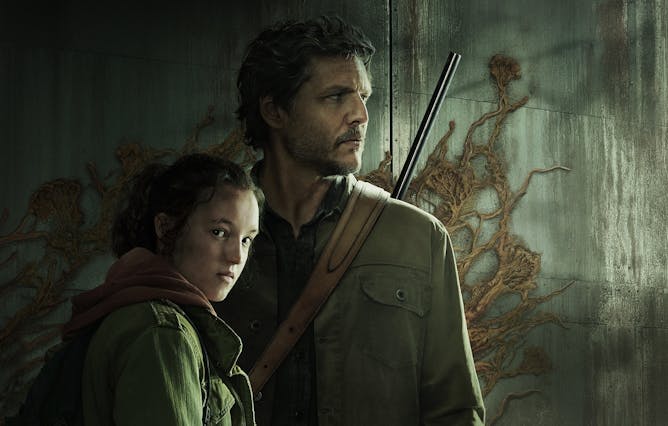
In the HBO series ‘The Last of Us,’ the parasitic fungus cordyeps mutates, and jumps from insects to humans and quickly spreads around the world, rendering its victims helpless to control their thoughts and actions.
(HBO)
Gerry Wright, McMaster University
While ‘The Last of Us’ is a dramatic projection of a deadly fungal outbreak, it is based, if not in reality, in logic. And it’s a reminder that fungal infections are growing more resistant.
|
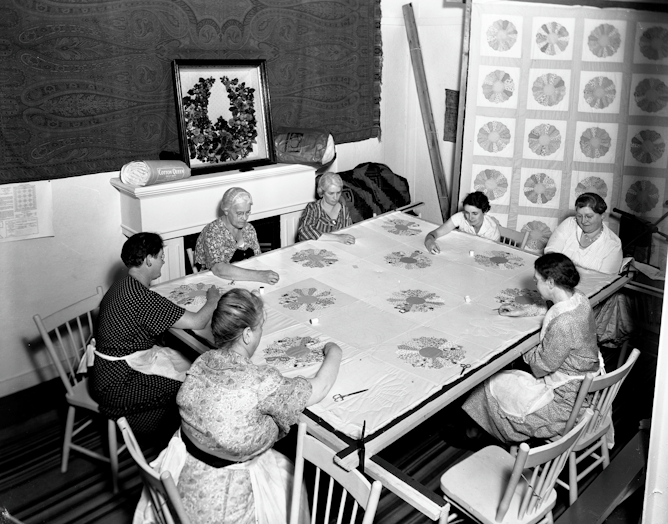
Women sew a quilt at the Quilting Bee Demonstration at the Canadian National Exhibition circa 1940.
(Canadian National Exhibition Archives)
Irene Gammel, Toronto Metropolitan University; Joanna Dermenjian, Toronto Metropolitan University
Canadian women made an estimated 400,000 quilts during the Second World War. The quilts represent the forgotten story of Canadian women’s efforts during the war.
|
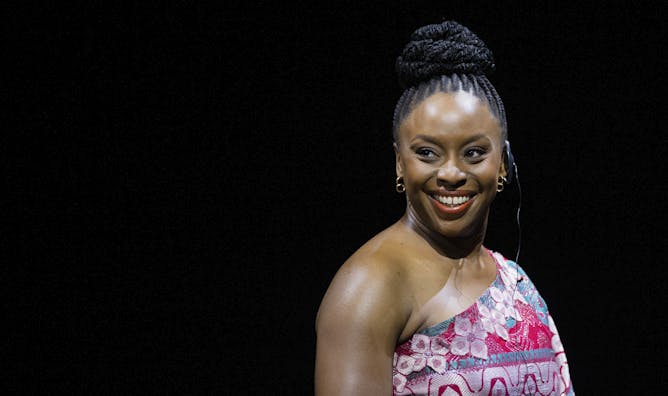
Nigerian author Chimamanda Ngozi Adichie’s novel ‘Purple Hibiscus’ intersperses Igbo words and expressions.
(Rolf Vennenbernd/Pool Photo via AP)
Michael Ross, McMaster University
Polyglot texts — texts that use many languages — have become increasingly common as writers document struggles between regimes of European hegemony and decolonizing movements.
|
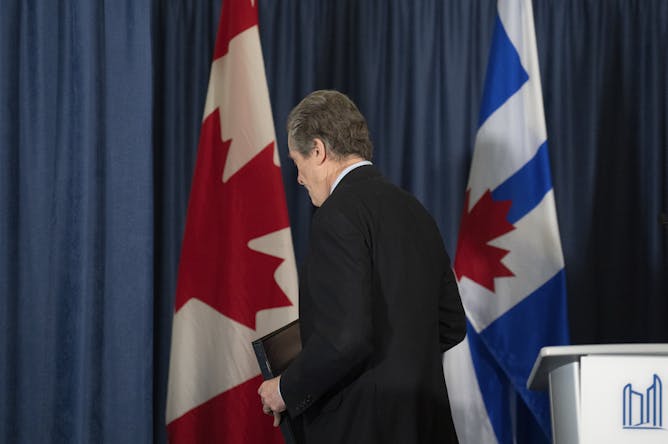
John Tory walks away from the Toronto City Hall podium on his last day in office on Feb. 17, 2023.
THE CANADIAN PRESS/Chris Young
Sam Routley, Western University
Many politicians have survived sex scandals and still held onto their jobs. But news about John Tory’s affair has brought an end to his career as Toronto mayor. Here’s what’s unique about Tory’s case.
|
La Conversation Canada
|
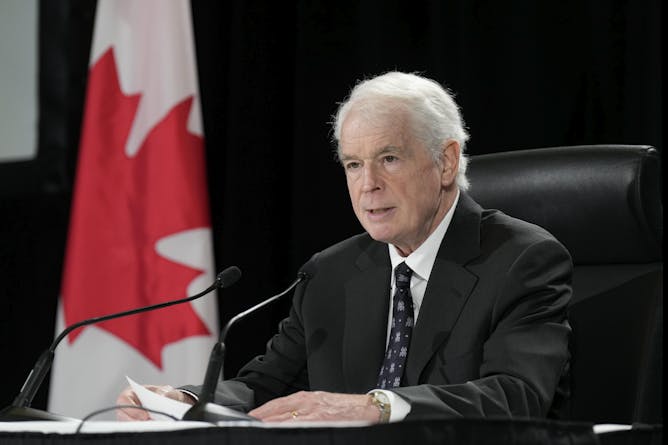
Le juge Paul Rouleau publie son rapport sur l'utilisation de la Loi sur les mesures d'urgences par le gouvernement libéral, à Ottawa, le 17 février 2023.
La Presse canadienne/Adrian Wyld
Frédérick Guillaume Dufour, Université du Québec à Montréal (UQAM); Stéphanie Auger-Caron, Université du Québec à Montréal (UQAM)
L’extrême droite ne doit pas être perçue comme un ensemble de petits mouvements indépendants, mais plutôt comme un réseau basé sur une idéologie extrémiste dangereuse pour la démocratie.
|
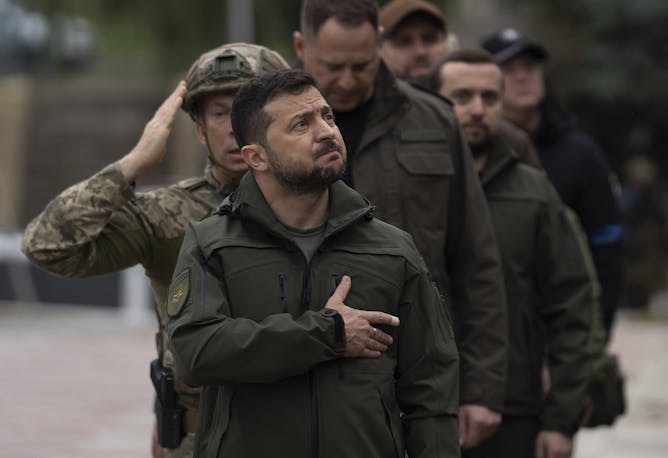
Le président ukrainien Volodymyr Zelenskyy participe à une cérémonie de lever du drapeau national à Izium, en Ukraine, le mercredi 14 septembre 2022. Il y a un an, alors que les forces russes fonçaient sur la capitale ukrainienne, les dirigeants occidentaux craignaient pour la vie du président Volodymyr Zelenskyy et les États-Unis lui ont offert une voie d'évasion. Zelenskyy a refusé, déclarant son intention de rester et de défendre l'indépendance de l'Ukraine.
(AP Photo/Leo Correa, File)
Jennifer Mathers, Aberystwyth University
Une spécialiste de l’héroïsme explique pourquoi les nations en conflit ont besoin de ces figures.
|
Podcasts
|
-
Nehal El-Hadi, The Conversation; Daniel Merino, The Conversation
Political will is necessary for governments to move away from oil. But alternative energies are not all that they seem, and should be considered carefully beyond the appearance of sustainability.
|
|
Arts
|
-
Wayne Muller, Stellenbosch University
Performing at the coronation of King Charles III will be just one of many firsts for the activist soprano.
|
|
Politics
|
-
Gilbert Achcar, SOAS, University of London
Whatever the reason for Putin’s invasion of Ukraine, the west and Russia have been spoiling for a fight for decades. The war must end before it leads to a global conflagration.
|
|
Science + Tech
|
-
Chris Impey, University of Arizona; Connie Walker, National Optical-Infrared Astronomy Research Laboratory
With the help of thousands of citizen scientists, a new study measured exactly how much brighter night skies are getting every year.
|
|
|
|
| |
| |
| |

|
| |
| |
| |
| |
| |
| |
|
|